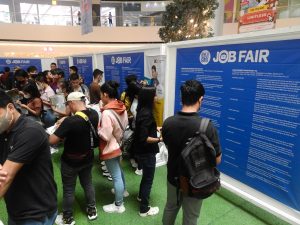Presidential Adviser for Entrepreneurship and Go Negosyo founder Joey Concepcion believes that the Philippines should re-examine its quarantine protocols for international travel in light of recent developments. Other countries have recently started easing their international arrival restrictions in light of recent developments in the pandemic. Among these countries are Switzerland and Thailand.
“It is quite understandable that public health should be the primary concern of governments. But as COVID itself changes, policy should be also open to re-examination,” he said. More specifically, he believes that facility-based quarantines and the specific use of RT-PCR tests need to be revisited.
“The entry requirements are so extensive and complicated that they put the country out of the reach of international visitors, and even our returning kababayans,” said Concepcion.
He added that when it comes to air travel, the focus should be on testing, and testing fast and accurately. “The goal is to find out if a passenger is infected, and if not, to send him on his way as fast as possible and not create bottlenecks,” he said.
Thailand recently announced that it will resume its quarantine-free visa program for vaccinated visitors. Switzerland, meanwhile, will not require pre-arrival COVID-19 tests for vaccinated or recovered visitors.
Concepcion noted that the US does not require specifically the use of RT-PCR tests or facility quarantines for arriving passengers. Inbound passengers to the US only need a negative result from an antiviral test, not necessarily an RT-PCR, taken no more than 24 hours before departure. Rapid tests are acceptable as long as they meet the requirements of the Centers for Disease Control and Prevention (CDC). This remains true even following the emergence of the Omicron variant. The US does not require facility-based quarantines for international passengers arriving in the US.
Currently, the Philippines has different rules depending on the passenger’s point of origin and vaccination status. All arriving passengers must test negative from an RT-PCR taken 48 hours before departure. Except for fully vaccinated travelers coming from the 32 countries in its Green list, all passengers get swabbed again after having spent at least five days in facility-based quarantine.
Concepcion believes that the Philippines can do the job with only an antigen test taken 24 hours prior to departure, saying that testing closer to the time of departure using an antigen test is more practical than waiting for RT-PCR test results, which take longer to deliver results and are more expensive. As an additional safeguard, he suggested conducting second antigen tests upon arrival.
And instead of facility quarantines, Concepcion is pushing for home-based quarantines. “Our OFWs can’t afford to spend their hard-earned money and precious time to spend days in facility quarantine,” he said.
“Other countries seem to have already accepted the fact that COVID is here to stay. Maybe it’s time we practice living with COVID or else the Philippine economy will suffer and along with it, its MSMEs,” he said.
Concepcion warned that how the country’s airlines will survive the pandemic depends largely on government policy. “This is also quite true of other industries that are downstream from air travel, not the least of which are the tourism and hotel and restaurant sectors. Many MSMEs depend on the trickle-down business generated by air travel,” he said.
“Our economy can’t shut itself to the world as our country’s debts continue to mount. Time is not on our side,” he said.
“We have already started taking the necessary steps by vaccinating and boosting the population. We have moved from prevention to treatment, thanks to efforts to make accessible antiviral medicines like Molnupiravir, which, from my own personal experience, seems to work,” he said.
“But these are baby steps. We need to take that leap of faith. While vaccines are the solution to keeping a healthy nation, learning to live with COVID will revive our economy and bring life back to our MSMEs,” he said.


